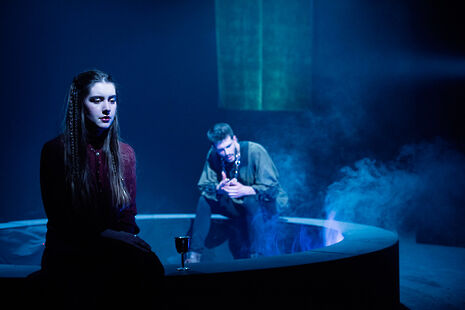Macbeth
Cara Atkinson finds this to be a strong, polished production

This polished production of Macbeth is visually stunning and deeply gripping. Although the play’s plot needs no introduction, thanks largely to the efforts of enthusiastic English and Drama teachers worldwide, it is worth emphasising that Macbeth is not easy to stage effectively. This is due, at least in part, to its reliance on the supernatural. The director, Nicholas Hulbert, and his extensive team of managers, designers and technicians have delivered a performance that does not shy from the difficulties that the text presents, but instead turns these issues into magnificent strengths.
The Weird Sisters (Rhianna Frost, Julia Kass, and Kate Reid), whose chants often verge on the comedic, are here rendered as eerie to the audience as they are to Macbeth. The play opens with the three witches contorting themselves, Gollum-like, around an enclosure that belches smoke. At the entrance of Banquo, the arrestingly good Guy Clark, and Macbeth (Tom Russell), the witches begin to predict the future. Their predictions, which initiate Macbeth’s murder of the king, infect the play like the Weird Sisters themselves. In a strikingly effective – and original – use of the small cast that literalises their influence over the play’s events, the Weird Sisters slink on stage as various messengers and soldiers, sustaining a sinister atmosphere throughout even the slower scenes. It is this seemingly simple directorial flourish that moves the production from competent to excellent.
However, even in the Weird Sisters' absence, scenes never fall flat thanks to the first-rate cast. Laura Waldren and Tom Russell, as Lady Macbeth and Macbeth respectively, give particularly poignant performances toward the end of the play as their characters disintegrate mentally, and I will not easily forget Macduff’s (Alasdair McNab) grief-stricken cries. In the final scenes of the play, it becomes clear precisely why two fight choreographers were needed, and the result is a simultaneously professional and riveting climax. This slick appearance is aided by the tonal lighting which, although the stage occasionally lapsed into murk due to the eye-watering amounts of smoke hanging in the air, highlighted the play’s preoccupation with the workings that underpin the visible world.
What underlies this well-crafted and haunting production is graft – it has been performed all over Europe and that experience shows. Now that it has returned to Cambridge, CUETG’s production of Macbeth is fully mature and almost flawless, and deserving of great praise.
 News / Clare Hall spent over £500k opposing busway 24 December 2025
News / Clare Hall spent over £500k opposing busway 24 December 2025 Comment / The ‘class’ of Cambridge24 December 2025
Comment / The ‘class’ of Cambridge24 December 2025 News / Caius mourns its tree-mendous loss23 December 2025
News / Caius mourns its tree-mendous loss23 December 2025 News / Girton JCR publishes open letter expressing solidarity with Palestine25 December 2025
News / Girton JCR publishes open letter expressing solidarity with Palestine25 December 2025 Comment / Yes, I’m brown – but I have more important things to say22 December 2025
Comment / Yes, I’m brown – but I have more important things to say22 December 2025









